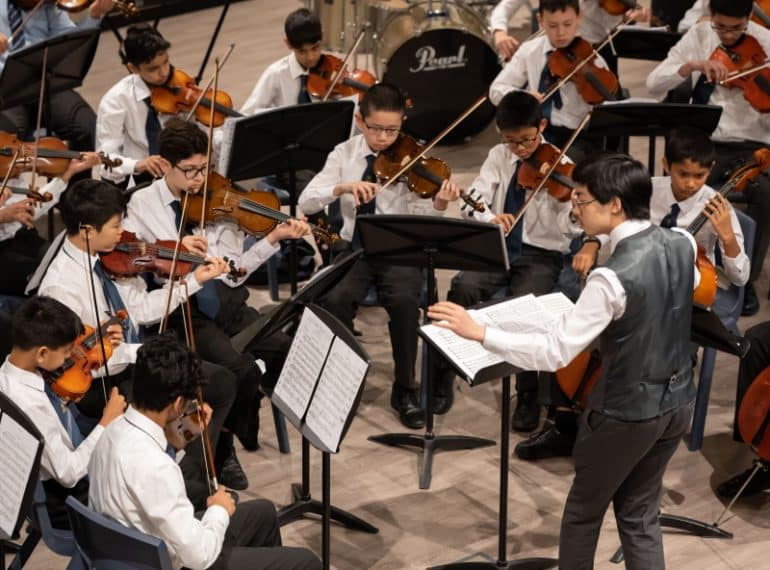
From the very first notes played by the Indian and Guitar ensembles in their Wednesday morning breaktime appearances through to guest pianist Béla Hartmann’s closing bars in the Friday night gala concert finale, the opening festival for QE’s new Music building was a feast of high-quality performance.
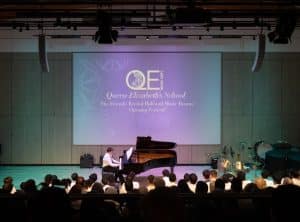 The three-day extravaganza marked the official opening of The Friends’ Recital Hall and Music Rooms by showcasing both the talents of the School’s young musicians and the new multi-million-pound facilities themselves.
The three-day extravaganza marked the official opening of The Friends’ Recital Hall and Music Rooms by showcasing both the talents of the School’s young musicians and the new multi-million-pound facilities themselves.
And in celebration of the expanded extra-curricular opportunities the state-of-the-art building will provide, a string of professional musicians were invited in to give talks, to lead masterclasses and to perform.
Headmaster Neil Enright said: “I am very happy to say that the festival was a great success, with many, many memorable moments, two magnificent evening concerts and a splendid atmosphere over the three days. All in all, this was a very worthy way to inaugurate this significant addition to our facilities, with participants truly rising to the occasion.
“Music is really flourishing here at QE, and the department now has the facilities it needs to support the teaching of the Music curriculum for all pupils, as well as the extensive range of extra-curricular music that enriches the QE experience for so many of our boys.
 “My congratulations go to our Director of Music, Ruth Partington, her Assistant Director, James McEvoy-Stevenson, Music teacher Caroline Grint and the small army of peripatetic teachers who have all helped the boys reach such high levels of performance.”
“My congratulations go to our Director of Music, Ruth Partington, her Assistant Director, James McEvoy-Stevenson, Music teacher Caroline Grint and the small army of peripatetic teachers who have all helped the boys reach such high levels of performance.”
The new building received the go-ahead in 2019 after the School’s application for a £1.2m grant and £1m loan from the Department for Education was successful. It has been completed with extensive financial support from the Friends of Queen Elizabeth’s (FQE) and through fundraising by the boys, including the Pianoathon held last summer to help pay for new upright pianos for the seven practice rooms. Pride of place in the recital hall goes to the new Yamaha CF6 grand piano, valued at just under £75,000, which was purchased by the School’s Foundation Trustees.
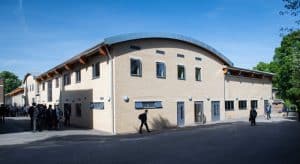 In addition to the Music facilities, the complex features a covered atrium for boys to use at lunchtimes and breaktimes which incorporates the new Mayes Atrium Café.
In addition to the Music facilities, the complex features a covered atrium for boys to use at lunchtimes and breaktimes which incorporates the new Mayes Atrium Café.
“My heartfelt thanks go once again to all those in the Elizabethan community who have donated to FQE and thus made possible this exciting project,” said the Headmaster.
The first day of the festival saw the breaktime performances by the Indian Ensemble and Guitar Ensemble, with lunchtime slots filled by Junior Jazz and the Jazz Band. In the afternoon, GCSE and A-level Music students, along with selected musicians from other Music groups, enjoyed talks by three Old Elizabethans and professional musicians: Rhys Bowden (1996–2003), an operatic tenor who teaches singing at QE; composer Richard Collins (2005–2012), and violinist Simon Purdy, who teaches the instrument at the School.
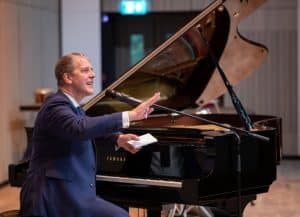 Day two saw the Junior Strings perform at break, with Junior Winds and Senior Winds both in action at lunchtime. The afternoon was taken up with masterclasses for the Pianoathon winners and for members of Junior Jazz and the Jazz Band led by pianist and improvisor extraordinaire, Harry the Piano.
Day two saw the Junior Strings perform at break, with Junior Winds and Senior Winds both in action at lunchtime. The afternoon was taken up with masterclasses for the Pianoathon winners and for members of Junior Jazz and the Jazz Band led by pianist and improvisor extraordinaire, Harry the Piano.
The evening saw Harry perform in concert in his inimitable style, with pre-concert and interval music provided by the Junior String Quartet, Sax Ensemble and Trumpet Ensemble. Two of the School’s star musicians, Year 8’s Noah Morley and Conor Parker-Delves, of Year 13, even had the chance to shine alongside Harry, performing improvisations with him.
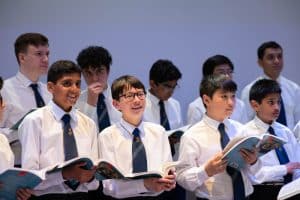 On Friday, the 160-strong School Choir gave the breaktime performances, enjoying the experience of all being together – something that was not possible in the old Music department. Lunchtime appearances were by the Orchestra and Senior Strings. Afternoon masterclasses for élite musicians were given by award-winning international pianist Béla Hartmann.
On Friday, the 160-strong School Choir gave the breaktime performances, enjoying the experience of all being together – something that was not possible in the old Music department. Lunchtime appearances were by the Orchestra and Senior Strings. Afternoon masterclasses for élite musicians were given by award-winning international pianist Béla Hartmann.
The final evening brought the Festival Concert, which was arranged particularly to demonstrate the acoustics of the recital hall and the capabilities of the Yamaha grand piano. The Senior Vocal Group played during the Headmaster’s Reception for donors and other VIP guests; the pre-concert welcome music came from the Saxophone Quintet and music during the interval was provided by the Senior Piano Trio and Senior Violin Trio.
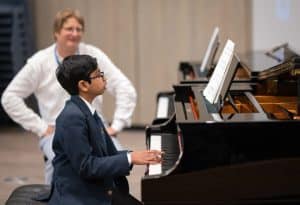 The concert’s main line-up featured a piano duet and piano, viola, cello and saxophone solos by the boys, as well as a first-half appearance by pianist Tadashi Imai, resident accompanist at the Royal Academy of Music and a piano teacher at QE. There were also appearances by the Jazz Band, Chamber Choir, Junior Violin Trio and Year 13 Flute Trio, before Mr Hartmann brought the concert programme and the festival to a conclusion. The repertoire ranged from Beethoven Chopin, Mendelssohn and Ravel to lesser-known composers such as Jules Demersseman and Carl Bohm, with one soloist, Jao-Yong Tsai, of Year 12, playing a sonata that he had composed himself.
The concert’s main line-up featured a piano duet and piano, viola, cello and saxophone solos by the boys, as well as a first-half appearance by pianist Tadashi Imai, resident accompanist at the Royal Academy of Music and a piano teacher at QE. There were also appearances by the Jazz Band, Chamber Choir, Junior Violin Trio and Year 13 Flute Trio, before Mr Hartmann brought the concert programme and the festival to a conclusion. The repertoire ranged from Beethoven Chopin, Mendelssohn and Ravel to lesser-known composers such as Jules Demersseman and Carl Bohm, with one soloist, Jao-Yong Tsai, of Year 12, playing a sonata that he had composed himself.

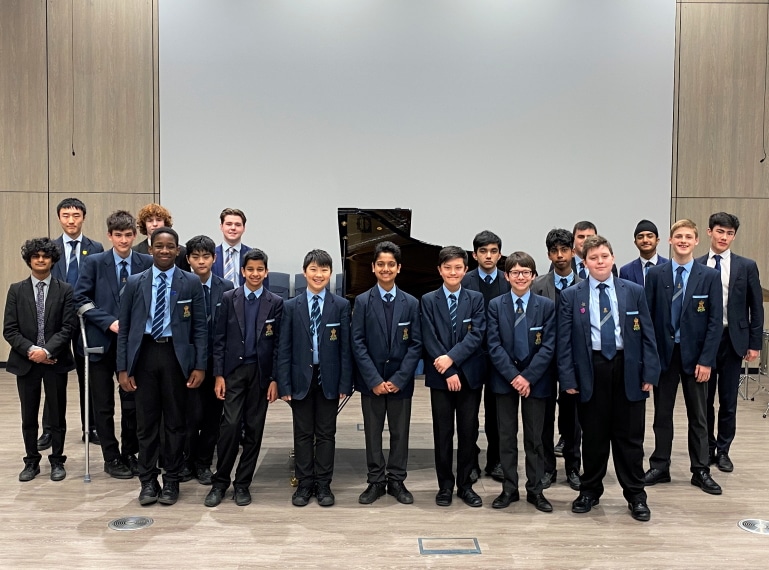
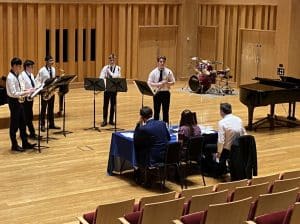 Six groups reached the semi-final of the Pro Corda National Chamber Music Festival for Schools – a total exceeded by only two other schools nationally – and two of the QE ensembles went all the way to the final at Millfield School in Somerset.
Six groups reached the semi-final of the Pro Corda National Chamber Music Festival for Schools – a total exceeded by only two other schools nationally – and two of the QE ensembles went all the way to the final at Millfield School in Somerset.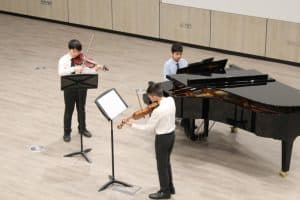 The trio were one of five groups competing in the U14 category. The trio comprises: Year 8 pianist Shreyas Iyengar; violin 1, played by Jamie Lam, of Year 7, and violin 2, played by Alex Kronabetter, of Year 8.
The trio were one of five groups competing in the U14 category. The trio comprises: Year 8 pianist Shreyas Iyengar; violin 1, played by Jamie Lam, of Year 7, and violin 2, played by Alex Kronabetter, of Year 8.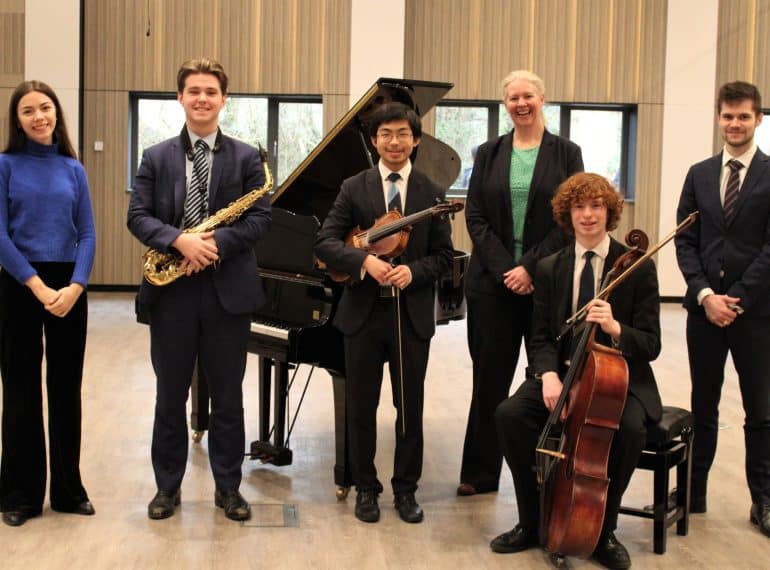
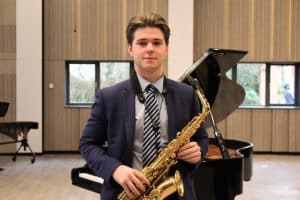 “I am also pleased that, following audition, Conor has been offered a place at the highly competitive Royal Northern College of Music to study saxophone when he leaves QE this summer, and Raphael has been offered a place to study Music at Clare College, Cambridge.
“I am also pleased that, following audition, Conor has been offered a place at the highly competitive Royal Northern College of Music to study saxophone when he leaves QE this summer, and Raphael has been offered a place to study Music at Clare College, Cambridge.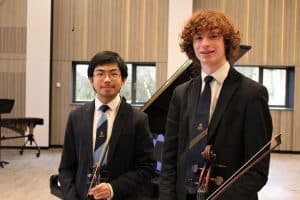 Raphael joined with the national Youth Orchestra this winter, as they expanded the strings section. “We played some fantastic music, including Rachmaninoff’s Symphonic Dances and Ravel’s La Valse, and had the opportunity to perform at the Barbican. I am also incredibly excited to be offered a conditional offer for Music at Clare College, Cambridge. I am looking forward to studying music in such an inspiring environment, as well as exploring the huge range of extra-curricular opportunities available.” Alongside the cello, Raphael is a highly accomplished pianist, and also sings in the choir, chamber choir, and barbershop group at QE.
Raphael joined with the national Youth Orchestra this winter, as they expanded the strings section. “We played some fantastic music, including Rachmaninoff’s Symphonic Dances and Ravel’s La Valse, and had the opportunity to perform at the Barbican. I am also incredibly excited to be offered a conditional offer for Music at Clare College, Cambridge. I am looking forward to studying music in such an inspiring environment, as well as exploring the huge range of extra-curricular opportunities available.” Alongside the cello, Raphael is a highly accomplished pianist, and also sings in the choir, chamber choir, and barbershop group at QE.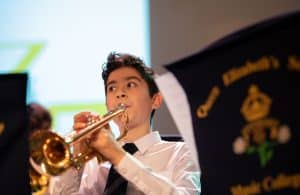 Form and beyond, whether it be with the department at QE, the NYO or at university when the time comes.”
Form and beyond, whether it be with the department at QE, the NYO or at university when the time comes.”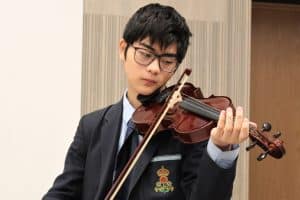 Ryuki, who plays the violin, noted that the School had given him experience of playing in different sized ensembles, as well as in prestigious competitions. “My trio got to the final of the Music for Youth Chamber Music competition and I have played in the Pro Corda Chamber Music competition in both a quartet and a quintet. I aim to take Grade 8 and then try to get into more big orchestras.”
Ryuki, who plays the violin, noted that the School had given him experience of playing in different sized ensembles, as well as in prestigious competitions. “My trio got to the final of the Music for Youth Chamber Music competition and I have played in the Pro Corda Chamber Music competition in both a quartet and a quintet. I aim to take Grade 8 and then try to get into more big orchestras.”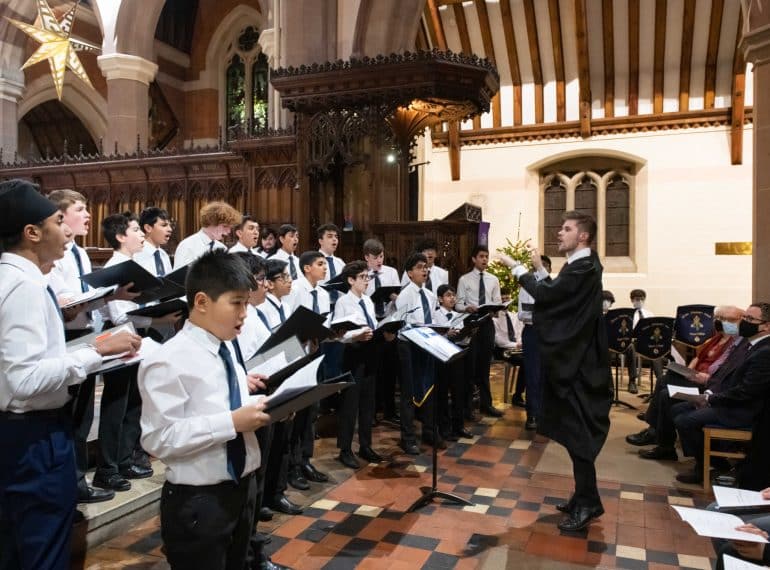
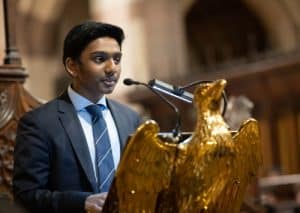 The Service of Nine Lessons and Carols featured not only congregational singing of familiar favourites, but also some lesser-known Christmas music from the School Choir and Chamber Choir. Senior staff and boys from throughout the School delivered the readings, culminating in Headmaster Neil Enright reading the Prologue to St John’s Gospel.
The Service of Nine Lessons and Carols featured not only congregational singing of familiar favourites, but also some lesser-known Christmas music from the School Choir and Chamber Choir. Senior staff and boys from throughout the School delivered the readings, culminating in Headmaster Neil Enright reading the Prologue to St John’s Gospel.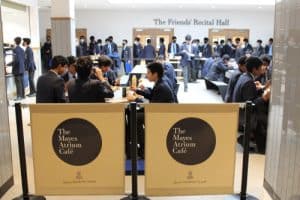 For Years 10 and 11, there was the added bonus of eating the meal in the pristine surroundings of the Mayes Atrium Café – part of the new Music School complex, which is due to be officially opened next term. The facility, built on the site of the previous Mayes Building, is named in honour of Harry ‘Curly’ Mayes, who served the School as butler, porter, steward and caretaker for 60 years, from 1902 to 1962.
For Years 10 and 11, there was the added bonus of eating the meal in the pristine surroundings of the Mayes Atrium Café – part of the new Music School complex, which is due to be officially opened next term. The facility, built on the site of the previous Mayes Building, is named in honour of Harry ‘Curly’ Mayes, who served the School as butler, porter, steward and caretaker for 60 years, from 1902 to 1962. The choral pieces at the carol service included:
The choral pieces at the carol service included: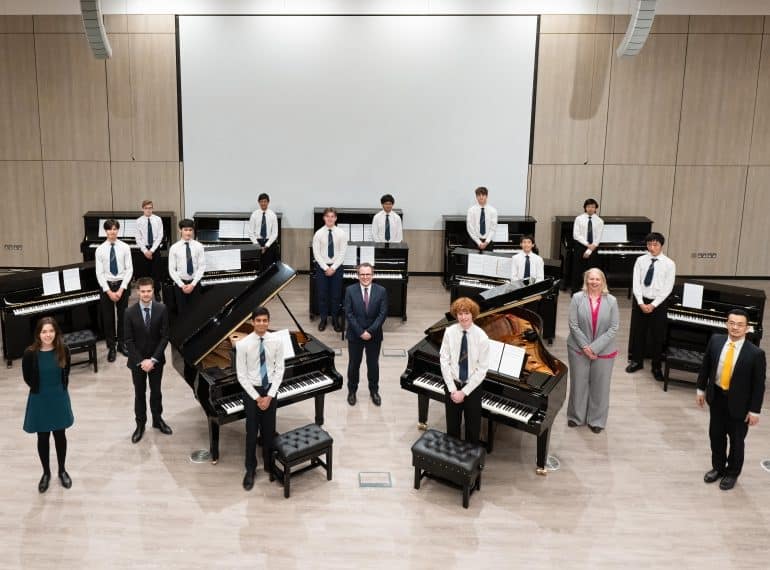
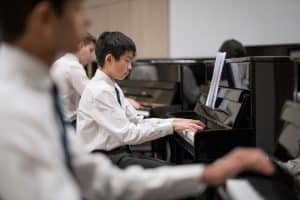 Headmaster Neil Enright said: “The boys revelled in the opportunity to spend some free time with these wonderful pianos, swapping around to try the different instruments and then enjoying the chance to perform together.
Headmaster Neil Enright said: “The boys revelled in the opportunity to spend some free time with these wonderful pianos, swapping around to try the different instruments and then enjoying the chance to perform together.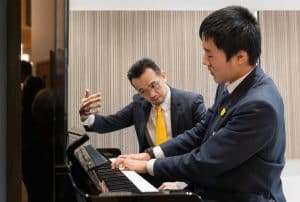 An opening festival for the Music School is being planned for early February – details to follow – all things being well!
An opening festival for the Music School is being planned for early February – details to follow – all things being well!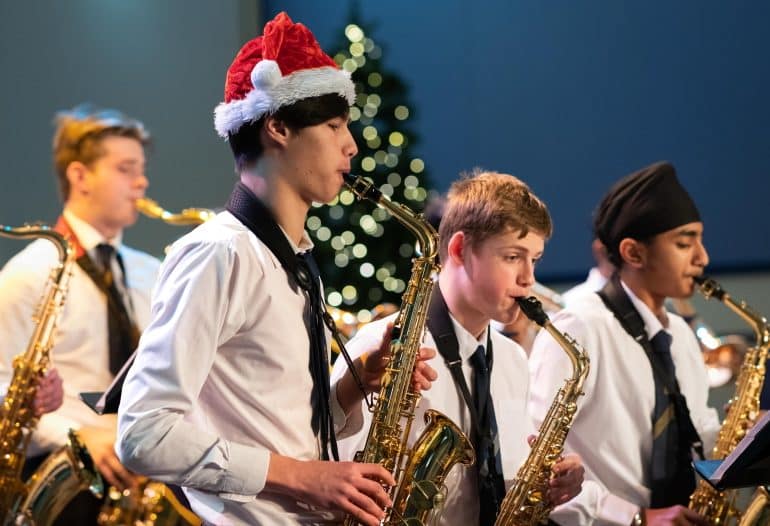
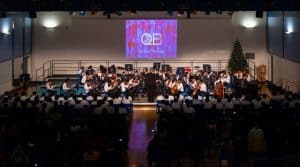 The Christmas Concert in the Shearly Hall featured scores of instrumentalists and singers tackling a programme that, although based around a festive theme, was very eclectic in nature.
The Christmas Concert in the Shearly Hall featured scores of instrumentalists and singers tackling a programme that, although based around a festive theme, was very eclectic in nature.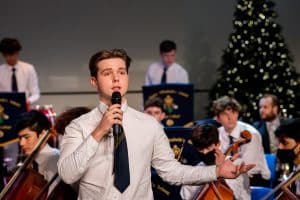 “The Indian Ensemble’s piece, Dhanashree Thillana, went down really well, as did the Guitar Ensemble’s rendition of Ozzy Osbourne’s Crazy Train. The inclusion of such repertoire in the programme amply demonstrates the importance of making space for different genres and sounds, while also showing very clearly that performance music can be fun.”
“The Indian Ensemble’s piece, Dhanashree Thillana, went down really well, as did the Guitar Ensemble’s rendition of Ozzy Osbourne’s Crazy Train. The inclusion of such repertoire in the programme amply demonstrates the importance of making space for different genres and sounds, while also showing very clearly that performance music can be fun.”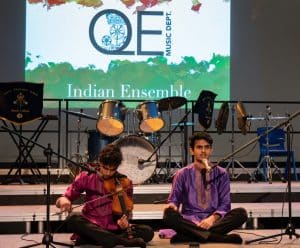 “The large numbers of participants in our junior ensembles, such as Junior Strings, was very noticeable: their involvement bodes well for the future.
“The large numbers of participants in our junior ensembles, such as Junior Strings, was very noticeable: their involvement bodes well for the future.